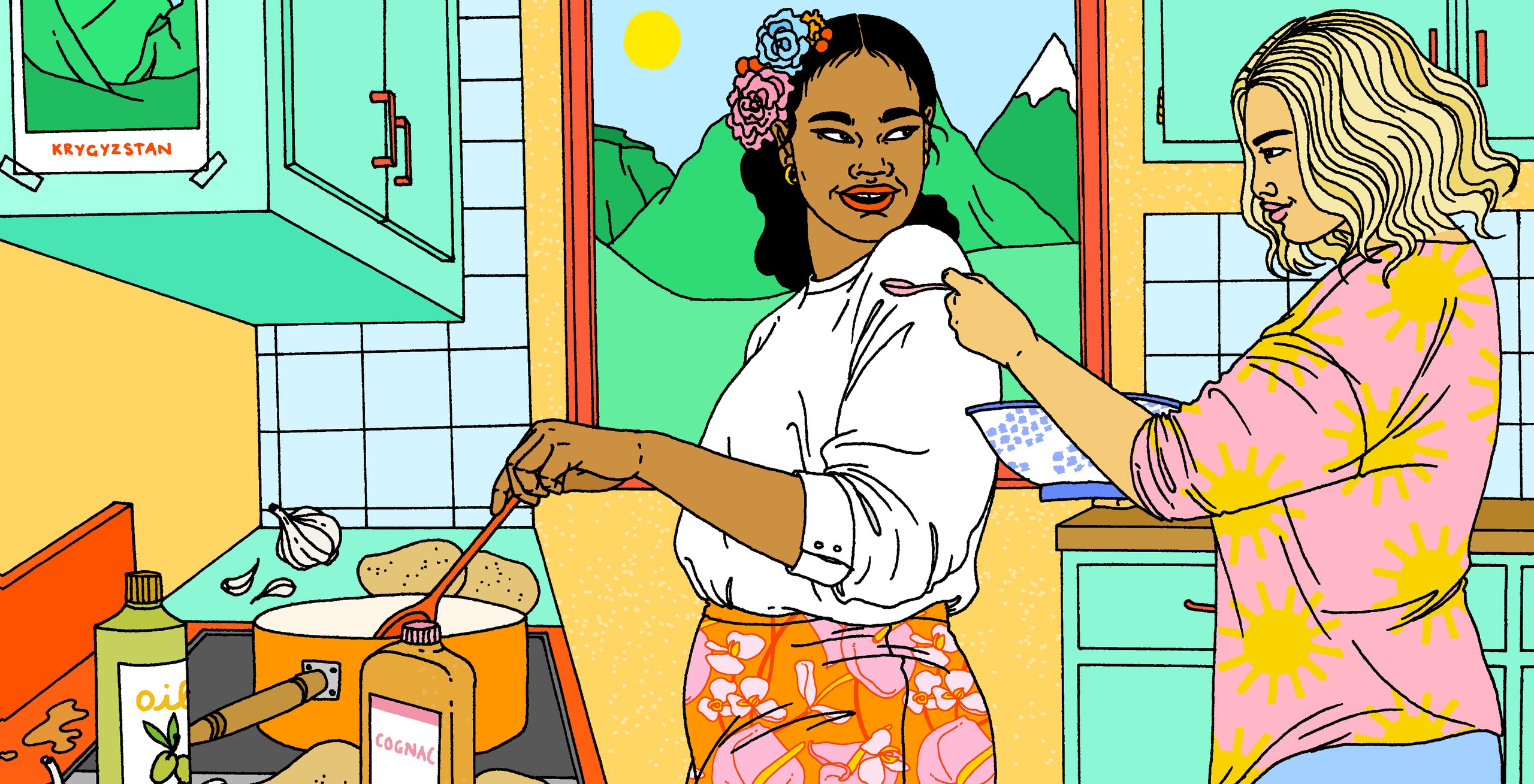“Learning to Make Lasagna in Kyrgyzstan” by Jia Tolentino (Kyrgyzstan)
Thanks for the ‘heads up’ from Bea Hogan (Uzbekistan 1992-94)
•
Learning to Make Lasagna in Kyrgyzstan
In the Peace Corps, cooking gave me a sense of purpose. Or did it just distract me from the purpose that had brought me halfway across the world?
by Jia Tolentino (Kyrgyzstan 2010)

Illustration by Laura Callaghan
I have never been less enamored of “seasonal and local” than I was the winter of 2010. I was living in a small village in the western mountains of Kyrgyzstan, teaching English in the Peace Corps. I had moved to the Central Asian state the previous March, and my arrival had coincided with the beginning of a period of instability there: a coup, a rash of nationalist violence, two militarized evacuations for my earnest cohort. (I had also, due to reasons admittedly within my control, almost gotten kicked out of the program on multiple occasions.) I had lost some of my appetite for local tradition as a consequence of this, and I had lost my appetite in general, as a Kyrgyz village in winter limits one’s diet to various combinations of potatoes, onions, sheep fat, and preserves.
Snow fell quietly on the streets and piled up on top of the woodsheds. Children led cows to barren pastures, and the sky-high birch trees were spindly, like ghosts. I didn’t understand how life strung together in Kyrgyzstan—the instinctive local calculus seemed to repudiate planning and bow enthusiastically to chance. I was 22, anxious and selfish, and increasingly anxious the more selfish I got. It was so cold I rarely left the room I rented from a local family. I realized that much of what I’d previously thought of as my cheerful and winning personality depended on having frivolous things to do. I was pining very hard after a boyfriend in Texas. As some attempt at pleasure substitution, I decided to teach myself how to cook.
The nearest market was an hour away, in a regional center called Talas. To get there, I took one of the buses called marshrutkas, which would come rattling through the main road every 45 minutes or so. After I’d spent an extended period in the village, Talas felt like Disney World. There were a couple internet cafes, a few restaurants; you could buy underwear, or a teapot, or dumplings on the street. The food bazaar, a maze of repurposed shipping containers, seemed like a display of staggering abundance—even in winter, when the overwhelming summer bounty of gorgeous, wormy produce was replaced by dry heaps of potatoes and onions. There was citrus still, and there were persimmons and old tomatoes. Other volunteers who lived in town tipped me off to hidden bazaar corners, manned by old Russian expat ladies who sold the good stuff: salt pork, mustard, imported cheese.
Even luckier, my best girlfriend in the volunteer group happened to be a French chef. Her real name, Laetitia, had been shortened to Lola by a local grandmother. She wore hairpieces with flowers on them, and she’d left a restaurant job in San Francisco to volunteer. We were stationed eight hours away from each other, but we’d done our initial training in the same village, close to the capital, when we’d first arrived.
“I began to see how cooking, as a pastime, could alleviate the paralyzing sense of incompetence that can descend on a person during unfamiliar and trying times.”
During those first months in Kyrgyzstan, Lola was determined that we would eat well and thoughtfully. After our language classes, she would make pizzas and layer cakes, elaborate salads and savory tarts. She never needed a recipe, and she knew how something was baking by the scent of the air in the room. Her hands would stop seasoning at the exact right moment, out of instinct. I’d been in the habit of cooking since middle school—mostly because my mom hated doing it, and my dad, a grill-loving Filipino Texan, traveled for work. But until I met Lola, I just made the same six things over and over. I didn’t know how anyone could look at a random pile of ingredients and, within minutes, know exactly what to do.
As there were few other diversions available to volunteers during training other than drinking cheap vodka and cooking for one another, I found Lola’s attitude inspiring. One day, for example, she came back from the market with a chicken and some awful cognac and made, seemingly out of nothing, a perfect coq au vin. We scrubbed down our Kyrgyz Tupperware (actually a utility bucket—the kind you might use to store rocks or chicken feed) and carried the coq au vin on a marshrutka to our friend’s house, where we feasted and felt better than we had in weeks. By then, Lola had designated me her sous-chef, teaching me a few techniques but mostly trusting that I’d pick them up on my own. I began to see how cooking, as a pastime, could alleviate the paralyzing sense of incompetence that can descend on a person during unfamiliar and trying times.
By winter, after a series of surprises and scares and failures, that sense of incompetence had become total. But as the snow began to fall and the sky turned impersonal, I tried to shop as optimistically as I could. After I fumbled through each school day—doing more to slow down my brilliant co-teacher than to help her—I came home and I cooked. Everything had to be from scratch, out of necessity, which was fine by me; nothing came so abundantly in country as time. I rolled tortilla dough out of flour, water, and oil. I made salsa from unfamiliar peppers. I pinched out clumsy ravioli, burned my tongue on cauliflower curries. I stacked slices of squash into lasagna to make the day go by faster and ate huge hunks of it when I felt lonely at night. When my appetite retreated further—I had contracted active tuberculosis, although I wouldn’t know it for another year—I just started making everything richer and sweeter. I made drop biscuits every morning, glazing them with honey butter. For dinner, I force-fed myself spaghetti carbonara. When even pasta stopped making me hungry, I subsisted on cake.
“I had relocated halfway around the world for a challenge I’d chosen. And rather than meeting it, I made persimmon pie.”
This was not how my neighbors were eating. Their lives were calibrated to subsistence, mine to diversion. The shame I had relieved by cooking—the sense that I couldn’t plan anything properly or do anything right—transformed into the shame that came from becoming exceedingly accomplished in the realm of self-care. Under the circumstances, my lifestyle felt damning. I was supposed to be helping other people. I had relocated halfway around the world for a challenge I’d chosen. And rather than meeting it, I made persimmon pie.
It won’t come as a surprise that I ended up leaving Kyrgyzstan early. My program gently pushed me out of the escape hatch, giving me the excuse of “interrupted service”—the interruptions being certain safety concerns, certain previous transgressions, my eventual admission that I wasn’t going to make it two years. In Texas, the first time I walked into one of those bright, superabundant airplane hangars that pass as grocery stores, I went straight to the cheese section and cried.
It was a relief, I’ll admit, to live in America again, where everyone is selfish, and the basic cruelty of inequality is so multivalent that it’s somehow more readily concealed. It nonetheless took me months to stop thinking of myself like a thought experiment in utilitarian ethics—to see that strenuous acts of service weren’t the only good things I was capable of doing. (Particularly if I wasn’t very good at those acts of service in the first place.) Six years later, what remains from that period is an unyielding and sometimes humiliating awareness of the gap between intentions and actions—and a palpable gratitude for the activities, like sex and cooking, that minimize that gap. It still feels like a miracle that I can walk into a grocery store and purchase nearly anything. That I can go home with a bag of whatever pleases me and make anything I want. What a privilege that is, and what a sense of possibility flows from it. Whenever I lose my sense of cause and effect, I cook.
“Taking care of myself wasn’t antithetical to being a working part of a community; it could have been the foundation of my service, if I had let it.”
In the weeks after the election, I have felt depressed and ashamed in a way that I haven’t since that lonely and butter-filled winter in Kyrgyzstan. But this time, I understand that what I’m feeling is nothing more complicated than an urge to restore some balance—to be as soft and easy as the coming fights will be hard. In November, I retreated to the kitchen, making banana bread and olive-oil cake and quiche. A friend organized a potluck, and among a group of flippant twentysomethings, our sense of emergency and our desire to take care of each other resulted in an overflowing table, everything carefully prepared. I feel less strange now about cooking my way back to operating capacity. Taking care of myself wasn’t antithetical to being a working part of a community; it could have been the foundation of my service, if I had let it. My guilt in Kyrgyzstan never did anything but paralyze me. It was bitter. What I’m after now is a different kind of sharpness—a focus that turns itself outward and knows it needs to be fed.
Jia Tolentino is a contributing writer at newyorker.com. She is the author of Trick Mirror and lives in New York. She is a Canadian-born American writer and editor. Previously she worked as deputy editor of Jezebel and a contributing editor at The Hairpin. This essay was published in Bon Appetit.
“”Nothing came so abundantly in country as time.” You are a gifted wordsmith. Were you not already writing for the New Yorker, I would strongly suggest that you aspire to venture to apply. But there you are already! Another Peace Corps success story! Woohoo!
David, please help me understand. Exactly what do you mean when you write “Another Peace Corps success story!”?
Beverly
Thanks for your question. Perhaps “Another kind of Peace Corps success story” more clearly conveys my intended meaning. The path to lifetime success and satisfaction for returned a Peace Corps Volunteer is not a straightforward formulaic story scripted in Washington by Peace Corps marketing and recruitment wonks. Peace Corps service veterans of various stripes have revealed over the years via their informal memoirs and anecdotes – many published on this Peace Corps Worldwide website — that there are myriad Peace Corps paths to successful, satisfying lifetime accomplishments. Jia Tolentino’s candid, engaging essay reveals that she was part of the Peace Corps story, and that her service in country was complex and traumatic and ultimately “interrupted.” Jia alone has to live with her decision to terminate early. However, after rereading her essay, I remain left with the notion that the Peace Corps service opportunity was a growth experience for her, contributed to her further mastery of the writers’ craft, and ultimately led her to her current professional prominence and success at The New Yorker. I do consider her victory as a kind of victory for Peace Corps.
I couldn’t be more in love with a stranger